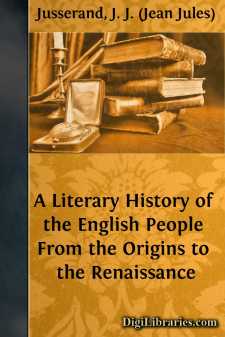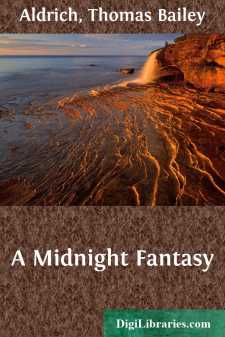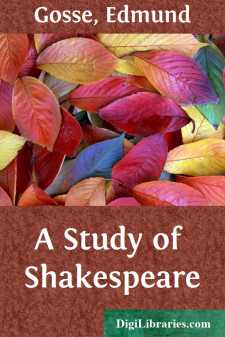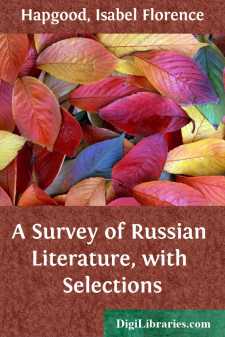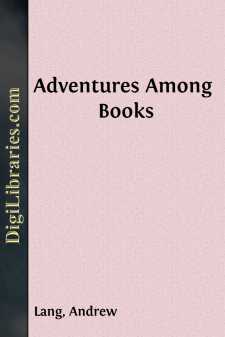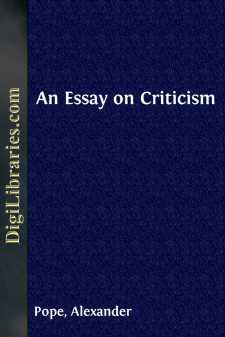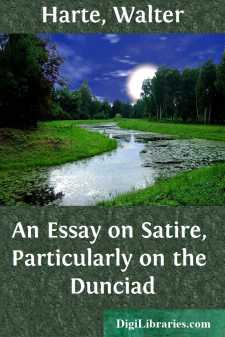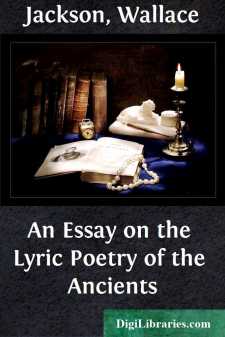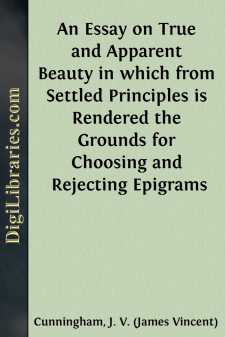Literary Criticism
- American 18
- Ancient and Classical 3
- Asian 1
- Australian & Oceanian 1
- Books & Reading 8
- Caribbean & Latin American 2
- Drama 2
- English, Irish, Scottish, Welsh 49
- European 7
- General 37
- Horror 1
- Humor 2
- Jewish 2
- Medieval 2
- Middle Eastern 3
- Poetry 7
- Renaissance 6
- Russian & Former Soviet Union 1
- Shakespeare 27
Literary Criticism Books
Sort by:
BRITANNIA. I. The people that now occupies England was formed, like the French people, by the fusion of several superimposed races. In both countries the same races met and mingled at about the same period, but in different proportions and under dissimilar social conditions. Hence the striking resemblances and sharply defined contrasts that exist in the genius of the two nations. Hence also the...
more...
It was close upon eleven o'clock when I stepped out of the rear vestibule of the Boston Theatre, and, passing through the narrow court that leads to West Street, struck across the Common diagonally. Indeed, as I set foot on the Tremont Street mall, I heard the Old South drowsily sounding the hour. It was a tranquil June night, with no moon, but clusters of sensitive stars that seemed to shiver...
more...
by:
Edmund Gosse
I. The greatest poet of our age has drawn a parallel of elaborate eloquence between Shakespeare and the sea; and the likeness holds good in many points of less significance than those which have been set down by the master-hand. For two hundred years at least have students of every kind put forth in every sort of boat on a longer or a shorter voyage of research across the waters of that unsounded...
more...
THE ANCIENT PERIOD, FROM THE EARLIEST TIMES TO THE INTRODUCTION OF CHRISTIANITY IN 988. Whether Russia had any literature, or even a distinctive alphabet, previous to the end of the tenth century, is not known. In the year 988, VladÃmir, Grand Prince of KÃeff, accepted Christianity for himself and his nation, from Byzantium, and baptized Russia wholesale. Hence his characteristic title in...
more...
by:
Andrew Lang
CHAPTER I: ADVENTURES AMONG BOOKS I In an age of reminiscences, is there room for the confessions of a veteran, who remembers a great deal about books and very little about people? I have often wondered that a Biographia Literaria has so seldom been attempted—a biography or autobiography of a man in his relations with other minds. Coleridge, to be sure, gave this name to a work of his, but he...
more...
CHAUCER March 17, 1894. Professor Skeat's Chaucer. After twenty-five years of close toil, Professor Skeat has completed his great edition of Chaucer. It is obviously easier to be dithyrambic than critical in chronicling this event; to which indeed dithyrambs are more appropriate than criticism. For when a man writes Opus vitæ meæ at the conclusion of such a task as this, and so lays down his...
more...
by:
Alexander Pope
ALEXANDER POPE. This eminent English poet was born in London, May 21, 1688. His parents were Roman Catholics, and to this faith the poet adhered, thus debarring himself from public office and employment. His father, a linen merchant, having saved a moderate competency, withdrew from business, and settled on a small estate he had purchased in Windsor Forest. He died at Chiswick, in 1717. His son shortly...
more...
by:
Walter Harte
INTRODUCTION Since the first publication of Walter Harte's An Essay on Satire, Particularly on the Dunciad,[] it has reappeared more than once: the unsold sheets of the first edition were included in A Collection of Pieces in Verse and Prose, Which Have Been Publish'd on Occasion of the Dunciad (1732), and the Essay is also found in at least three late eighteenth- or early nineteenth-century...
more...
by:
Wallace Jackson
INTRODUCTION John Ogilvie (1733-1813), Presbyterian divine and author, was one of a group of Scottish literary clergy and a fellow of the Edinburgh Royal Society. Chambers and Thomson print the following generous estimation of his work:Of all his books, there is not one which, as a whole, can be expected to please the general reader. Noble sentiments, brilliant conceptions, and poetic graces, may be...
more...
INTRODUCTION The following essay forms the introduction to a famous anthology of the seventeenth century, the Epigrammatum delectus, a Port-Royal textbook published at Paris in 1659. The essay was twice translated into French in the same century, but the use of the text in France did not survive, apparently, the downfall of the Port-Royal movement. It was, however, later adopted by Eton College, where...
more...


